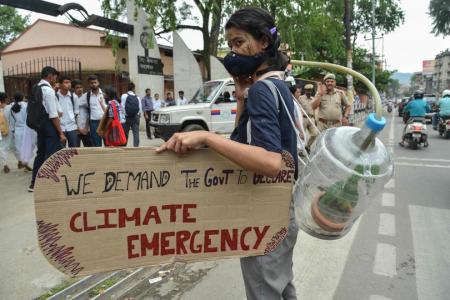Climate change fight is about human survival, say Singapore experts
Singapore experts among over 11,000 declaring climate emergency in study
He wonders if it might be too late already. She says the fight has reached a stage where it is about the survival of the human race.
Dr Huang Danwei, assistant professor from the Department of Biological Sciences at the National University of Singapore, and Dr Joanna Coleman, a senior lecturer at the department, were among 19 signatories from the Republic of the study published in the journal BioScience on Nov 5, World Scientists' Warning Of A Climate Emergency.
For the first time, 11,258 scientists and environment specialists from 153 countries formally declared "clearly and unequivocally that planet earth is facing a climate emergency".
Speaking to The New Paper last week, Dr Huang said: "I worry we may not be doing enough. In 30 years' time, it might become clear that we have not done enough to prevent floods, e-waste that can be a public health hazard.
"We are doing something but it needs to be a whole-of-nation initiative."
In the study, the scientists and environment experts said the urgent changes needed include ending population growth, leaving fossil fuels in the ground, halting forest destruction and slashing meat eating.
The study grabbed the world's attention, and Dr Coleman felt it was an important move as it disproved the critics who argued that climate change did not have scientific consensus.
Melting sea ice, rising sea levels, raging fires in California and Australia and increasing deforestation are some of the reasons she believes the climate change fight has reached a critical stage.
"I am concerned about surviving and survival, to ensure that human and non-human life will have enough to live on and flourish," said Dr Coleman.
Prime Minister Lee Hsien Loong described climate change as "one of the gravest challenges facing humankind", in his National Day Rally speech in August. As Singapore is a low-lying island, the Republic would be especially vulnerable to rising sea levels, he said.
Mr Lee said the Government had set up the Centre for Climate Research Singapore to study the effects of climate change and has committed to slow down as well as cap carbon dioxide emissions by around 2030 as part of the Paris climate agreement.
New developments are required to be built at least 4m above mean sea level, and the requirement is even higher for critical infrastructure such as Tuas Port and Changi Airport Terminal 5, said Mr Lee, who added that options to reclaim a series of islands from Marina East to Changi as well as build polders will be considered.
Mr Lee said in his speech that Singapore was already feeling the effects of climate change with higher temperatures and heavier rainfall.
The urgent need to fight back was reinforced when the National Climate Change Secretariat and the Ministry of the Environment and Water Resources jointly stated in an information kit published in August: "Climate change will threaten our access to essential resources such as water, food and energy. It will also potentially impact our biodiversity and health."
NEED FOR ACTION
Dr Huang hopes the study will help the public realise the need for action and the importance of sustainable action.
Dr Coleman stressed that it will require a global effort to fight climate change.
She said: "Otherwise, it is my generation, my students' generation and future generations that will have to deal with the consequences."
Get The New Paper on your phone with the free TNP app. Download from the Apple App Store or Google Play Store now



